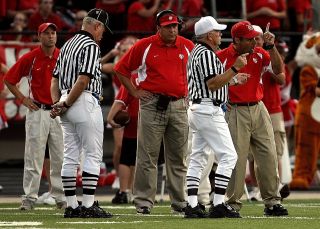Sport and Competition
Coaches' Mental Health Matters
College athletics leave coaches outside of mental health care plans.
Posted July 27, 2023 Reviewed by Ray Parker
Key points
- Athletic departments should invest in coaches' well-being as creatively as they support athletes.
- A recent NCAA survey finds coaches' mental health under pressure, high stress, and exhaustion.
- Mental health concerns are elevated for coaches under 40, female, BIPOC, and LGBTQ.

The NCAA Student-Athlete Well-Being Study released in May 2022 identified a significant increase in student-athletes experiencing mental health concerns following the COVID-19 pandemic. Elevated rates of mental exhaustion and anxiety were common, with even higher rates of mental distress observed among historically marginalized student-athletes (i.e., women, student-athletes of color, queer student-athletes, student-athletes from economic hardship).
The study also explored mental health support received by student-athletes, finding that less than half (47 percent) would be comfortable personally seeking support from a campus mental health provider and just over half (53 percent) believed that their coaches take mental health concerns seriously. Notably, 61 percent of female and 40 percent of male student-athletes considered their mental health and well-being as part of their decision to transfer.
NCAA Coach Well-Being Study
The NCAA next released a report on collegiate coaches. In January 2023, the NCAA Coach Well-Being Study surveyed more than 6,000 head and assistant coaches across all three NCAA divisions.
Mental health was identified as a critical issue, with the unique and substantial pressures of coaching in a collegiate athletic environment manifesting in high levels of stress and exhaustion. Some of the major challenges were identified as pandemic-related issues: managing rosters, the evolving transfer landscape, budget concerns, and dealing with personal challenges (e.g., finances, childcare).
One-third of coaches identified mental exhaustion, feeling overwhelmed by all they had to do, and sleep difficulties. These concerns were elevated among coaches under the age of 40, female coaches, coaches of color, and queer coaches.
Consistent with the increase in mental health concerns among student-athletes, the study found that coaches were more concerned than ever about the mental health of their student-athletes and how to respond to it. The top issue facing teams identified by coaches was supporting student-athlete mental health.
Yet, many collegiate athletic departments still lack dedicated sport psychologists or athletic counselors, let alone a full sport psychology service with appropriate resources and staffing to meet the needs of large, diverse departments with multiple teams, identities, and presenting concerns.
Mental Health Resources for Student-Athletes
While sport psychology providers and services are increasing at the collegiate level, these resources are nearly exclusively situated to serve student-athletes, not coaches or their staffs. While regular collaboration and consultation between coaches and sport psychologists is integral to support the mental health needs of student-athletes, sport psychology services are typically not designed to respond to the mental health needs of coaches themselves. This is due in large part to the conflicts of interest that could arise when working with both coaches and student-athletes from the same teams or departments.
Ultimately, dedicated mental health providers for collegiate athletes arose out of the recognition that general student counseling services were often unable to meet the unique needs of collegiate athletes. Providers who understand scheduling demands, athletics culture, and the integrated nature of college athletics were hired either by college counseling centers to serve as liaisons to athletic departments or by athletic departments themselves across the country.
These providers are increasingly positioned in athletics facilities vs. elsewhere on campus to increase direct access for student-athletes and promote a model of integrated sports medicine (e.g., athletic training, nutrition, sport psychology).
Lack of Mental Health Resources for College Coaches
Yet, where athletic departments fall short is recognizing that these same unique needs apply to athletic coaches and staff. While sport psychology services for athletes are growing in popularity, similar services for coaches remain almost nonexistent.
Coaches are employed by the university, meaning they typically have access to employee assistance plans and insurance-based networks of providers. However, rarely do providers accessible through these channels have an in-depth understanding of the nature of collegiate athletics, including scheduling demands, high-pressure environments, and athletics culture as a whole.
Many coaches are expected to be available to their student-athletes 24/7, face a high level of scrutiny about the performance of their student-athletes, and typically operate under year-to-year contracts leaving little job security. These pressures have been heightened in the new college transfer era, with one third of coaches in the NCAA Coaches Well-Being Study being very concerned about the possibility of their student-athletes transferring away.
Further, gender and racial inequities and bias make the college coaching landscape even more difficult for women, coaches of color, and queer coaches, with collegiate athletics remaining largely white spaces and gender/racial inequities in salary, resource allocation, and facilities being commonplace.
Addressing Coaches' Mental Health
So, what do we do to address coaches' mental health?
First, we have to be willing to talk about it, and not just once a year during May’s Mental Health Awareness Month. When athletic directors and head coaches—particularly of revenue-generating sports—acknowledge the need for mental health resources and support for their staff, it normalizes and creates a culture of well-being in athletic departments.
In response to the NCAA Coach Well-Being Study, many coaches expressed a desire for increased communication with their departments (i.e., wanting to be heard, having opinions be respected), improved work-life balance, and resources and understanding similar to what their student-athletes receive.
More tangibly, is it unreasonable to consider whether contracting part-time or even hiring full-time sport psychology providers for athletic department coaches and their staff is within the scope and responsibility of athletic departments? At a minimum, universities should ensure that employee assistance plans and in-network providers include and identify available providers who are competent in sport culture.
Just as important is ensuring that available resources include competency in serving young, female, queer, and coaches of color, who experience heightened mental health concerns and marginalization in collegiate athletic departments.
Collegiate athletic departments are well-known for being creative and strategic in the ways they identify resources and support student-athlete well-being. It’s time we expect the same creativity and investment in the well-being of coaches and their staff.
When the mental health of coaches thrives, so does the mental health of their student-athletes, staff, and athletic departments as a whole.
References
National Collegiate Athletic Association. (2022) NCAA student-athlete well-being study. Retrieved from: https://ncaaorg.s3.amazonaws.com/research/other/2020/2022RES_NCAA-SA-We…
National Collegiate Athletic Association. (2023) NCAA coach well-being study. Retrieved from: https://ncaaorg.s3.amazonaws.com/research/wellness/2023RES_NCAA-Coach-W…




